Wale Edun says the World Bank’s $2.25bn loan to Nigeria is the “closest you can get to free money.”
The Coordinating Minister of the Economy and Minister of Finance Wale Edun, said the Federal Government has qualified for a 40-year term loan with a 10-year moratorium, which he described as ‘virtually a grant’ of $2.25 billion from the World Bank at one percent interest rate. He said the government is considering issuing a diaspora bond.
The Minister spoke at a press conference held after the annual meetings of the International Monetary Fund (IMF) and World Bank Group in Washington D.C. He said the country is also set to benefit from budgetary support and low-interest funding from the African Development Bank ( AfDB).
He said the bank’s board of directors has approved the credit, currently under processing.
He added that they are also negotiating with foreign direct investors that will have huge benefits across the value chain in the country’s investment flows.
Some of these things take longer than you expect but they are relatively advanced discussions on major foreign direct investments flows into the country, specific transactions with specific companies, institutions, and authorities, he said.
He also said that to boost capital inflows into the country, the current administration was looking to double the current diaspora remittances and expects a substantial and successful diaspora bond issue later in the year.
“In terms of remittances, it is one of how we can boost foreign exchange supply and funding for investment in the country. There are Nigerians abroad, they are doing very well. They have significant funding. There are even Nigerians in Nigeria with funds abroad. That too would be counted as a remittance.
And to help the issue of supply of foreign exchange to the Nigerian economy, the government is looking at attracting those funds and capturing those funds through a diaspora type of instrument- a diaspora bond.”
Edun pointed out that having achieved some level of success in stabilising the economy, the federal government remained focused on attracting funds to support growth.
He said one of the challenges currently confronting the government was attracting long-term funds for long-term uses, particularly the provision of low-interest mortgages.
He added that unlocking such funds would help to grow the economy by creating jobs in the medium term adding that while the Central Bank of Nigeria (CBN) is currently focused on curbing inflation, the fiscal side was making efforts to create an enabling environment for investments.
Edun emphasised the critical importance of generating revenue, particularly from oil, as a primary source, with endeavours focused on maximising its benefits for Nigerians. He pointed out that President Bola Tinubu has established ambitious goals to increase oil production, targeting a rise to two million barrels per day from the current 1.6 million.
Edun said the government continued to engage with international investors particularly the foreign direct component to attract quality funding to build factories and directly create jobs.
He said these investors have demonstrated greater confidence in the management of the economy, including a renewed willingness to invest in the country.
The Central Bank of Nigeria Governor Yemi Cardoso in his remarks said, besides the meetings with multilateral financial institutions, and foreign investor groups with a keen interest on developments in Nigeria, including a critical gathering at the US Chamber of Commerce, we had very productive discussions with leading International Money Transfer Operators (IMTOs), where we collectively committed to doubling remittance flows through formal channels into Nigeria in the immediate short to medium term.
This target is both ambitious and achievable, and we’re wasting no time in setting up a collaborative task force, reporting to myself, to drive progress and address any bottlenecks that hinder flows through formal channels, he said.

